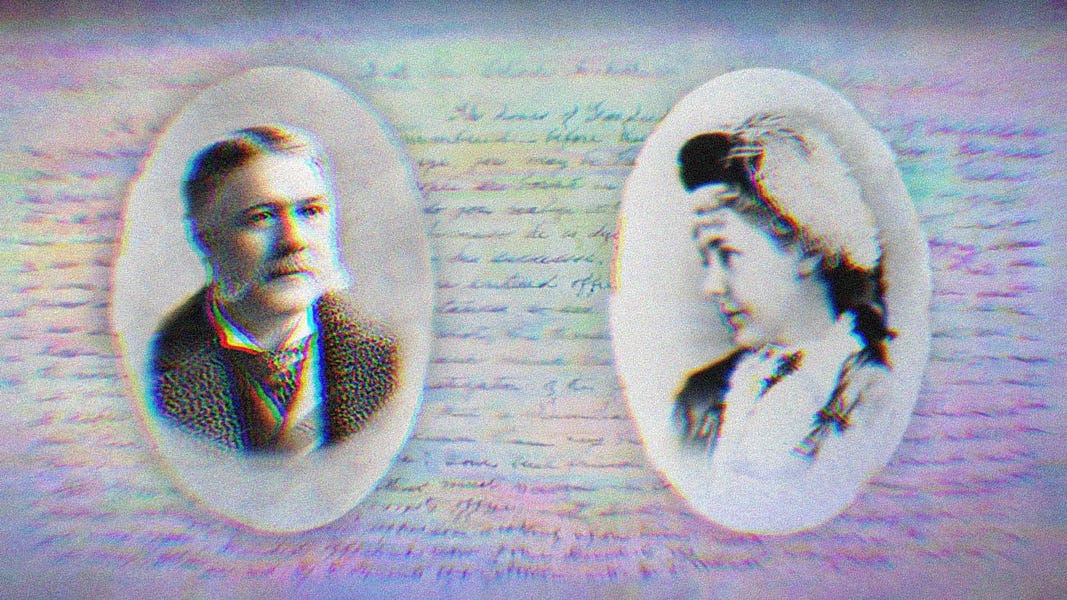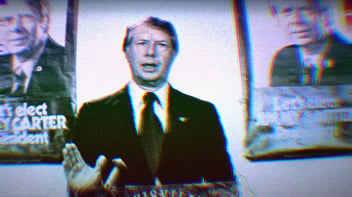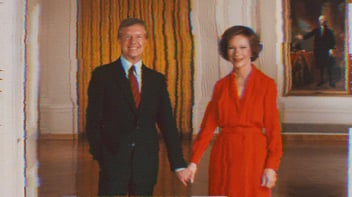Strange Bedfellows: Chester A. Arthur and Julia Sand
 Image Description: Black and white portraits of Chester A. Arthur and Julia Sand. Sand's letters to Arthur are featured, lightly blurred in the background.
Image Description: Black and white portraits of Chester A. Arthur and Julia Sand. Sand's letters to Arthur are featured, lightly blurred in the background.
Once again under suspicion for theft, Charles Guiteau made a hasty retreat from Boston aboard the SS Stonington in the summer of 1880. Whilst on the Connecticut River, the Stonington collided with the SS Narragansett. Despite the loss of life on the Narragansett, the Stonington crawled to shore with a relieved Guiteau on board, believing that he was spared due to divine intervention.
Throughout his life, Guiteau struggled with mental illness and would constantly run afoul of the law, but his brush with death gave him a renewed sense of purpose. So he decided to enter politics as a supporter of the so-called Stalwarts wing of the Republican Party that supported a third term for Ulysses S. Grant. Ultimately, the split in the party paved the way for the emergence of one of the most unlikely candidates for president in U.S. history. Unlikely, because he didn’t want the job, but also because it’s arguable that this person was one of the most qualified candidates ever put forward in nomination.
The candidate was James Garfield, who would go on to win the nomination and then the presidency. Fate would bring Garfield and Guiteau together briefly and alter the course of American history.
A Nation Adrift
A Concise History of the American Republic, published by the Oxford Press, refers to this era, saying, “There is no drearier chapter in American political history than that which records the administrations of Hayes, Garfield, Arthur, Cleveland, and Harrison.”
This obviously came out before 2016.
After the Civil War, the country was agitated and adrift. The economy of the nation was extremely fragile, and any gains made by formerly enslaved people were erased by Andrew Johnson. The North and South still harbored bitter resentment, and most Americans had lost faith in a political system marked by spoils and grift. One of those who was thought to represent the corrupt nature of the political spoils system was known as “The Gentleman Boss” of New York City: Chester A. Arthur.
Arthur: Why thank you very much.
That wasn’t a compliment. It’s more of a backhanded compliment.
Arthur: Oh. Well then, fuck you very much.
Chester “Chet” Arthur was born in Vermont in 1830. An outstanding student, Arthur earned entrance to Union College at the age of 15 and graduated by 18. Arthur would go on to earn a law degree and begin practicing in New York City. According to his biography in The Graphic Story of the American Presidents, “The son of an ardent abolitionist, Arthur often undertook the defense of fugitive slaves. In one famous case, he helped six slaves obtain their freedom from their Virginia owner who had made the mistake of thinking that he could transport them through the free state of New York.”
Arthur: Sounds like I’m a pretty terrific fellow, if I do say so myself.
You weren’t a bad dude. It’s just that later in your career, you would be swept up into the notoriously corrupt political machine in New York City when appointed the Collector of the Port. You were paid handsomely in a role that many felt was extortionist, and it was a pure patronage gig given to you by President Grant.
Arthur: This seems like a ‘you’ problem.
The bigger issue with this position is that it gave you the authority to appoint about 100 other patronage jobs, so naturally you were bombarded with office seekers and leeches from the Republican Party. So, I’m not saying you were corrupt. But, it was a bullshit position that represented the pinnacle of the Republican machine at the time.
Arthur: If I may, young man. What the devil is your point in profiling me in your, what do you call this? Your pod-cast transcript?
I’m getting there. So Arthur was indeed so loyal to the cause that he was a key member of the Stalwart wing of Republicans during the convention that put forward Grant’s name for a third term. But, when James Garfield surprisingly won the nomination, Arthur’s name was entered as Vice President to ensure that the Stalwarts had a voice in the administration should Garfield carry the presidency.
Long story short, he did.
“I am a Stalwart!”
Garfield, the last presidential candidate to be born in an actual log cabin, was perhaps the most qualified person to ever seek the office. Actually, he wasn’t seeking it at all, which speaks to his popularity that he was even considered on the ballot. Garfield almost crossed paths with Arthur early in his career as a teacher, as the prior teacher in the post was none other than Chet. Anyway, Garfield was himself an excellent student who went on to achieve glory on the battlefield in the Civil War. He would go on to be elected to Congress, promote Reconstruction and serve on several important committees while in office.
Now, as I mentioned, Garfield would go on to receive the nomination to represent the Republican Party, even though he never sought it or campaigned for it in any way. Again, from The Graphic Story:
“Upon returning to Washington, Garfield, a superstitious man, told President Hayes of two omens bearing on his nomination, which Hayes noted in his diary of June 15: ‘As he entered the Convention the day of his nomination, a man distributing leaves of the New Testament handed him a leaf which he [Garfield] put in his pocket.
“Long after the nomination, emptying his pockets, the leaf was found. The verse that was uppermost as it was folded read ‘the stone which the builders reject, etc.’ At one o’clock p.m., the hour of the nomination, an eagle lit on Garfield’s house in Washington and sat there several minutes and was seen by many persons.”
Garfield went on to narrowly secure victory and made his first promise. To reform civil service, which was seen as an example of corruption in the republic. Just weeks into his presidency, however, Garfield would be approached by Charles Guiteau.
“I am a Stalwart! Arthur is now President,” exclaimed Guiteau as he shot a stunned Garfield in the back.
Letters
Sand: “The hours of Garfield’s life are numbered—before this meets your eye, you may be President. The people are bowed in grief; but—do you realize it?—not so much because he is dying, as because you are his successor.”
This rather blunt sentiment was the opening salvo in what would be a long-term, somewhat one sided correspondence with the soon-to-be President of the United States. We’ll come back to the writer in a moment.
First, back to our story.
Charles Guiteau believed he had been responsible for Garfield’s election, mostly because he wrote a speech that appears to have only been delivered twice in support of Grant. Then he crossed out Grant’s name and inserted Garfield’s when Garfield won the nomination.
Believing he was wronged by the new administration when he wasn’t given credit in the form of spoils, Guiteau walked up to Garfield as he was about to board a train and shot him in the back. He would later be executed.
Garfield hung on for nearly two months. As it turns out, the bullet wasn’t what killed him. Rather, it was the White House physician who did not believe in the new science of sterilization, and went digging into Garfield’s back to retrieve the bullet with his bare hands. Garfield developed a terrible infection as a result, and would die a slow and painful death over the next two months; and for the second time in a generation, the country mourned the loss of a sitting president.
Throughout the ordeal, the one person absent from the national scene was Vice President Chester Arthur. Again, The Graphic History:
“After Garfield was shot, Arthur made no effort to assume the duties of the presidency in the 80-day period while the President hovered near death. He particularly hesitated to make any such move in light of the assassin’s declaration that the motive for the crime was to make Arthur President and put the Stalwarts in control of patronage.”
Enter, Julia Sand.
Sand: Hello! Me again.
One of the only reasons we know about Julia Sand is the recovery of her letters to Arthur, now housed in the Library of Congress. The recovery of these letters is a miracle in its own right, as Arthur ordered the vast majority of his personal correspondences be burned upon his death. However, mixed among 1,800 personal and official documents were 23 letters from Julia Sand, hidden in a safe and locked away for decades until given to the family in 1937.
Julia Sand was the youngest of nine children. She was by all accounts extremely well educated, but multiple illnesses kept her relatively housebound most of her adult life. The Sands were a rather prominent family in New York, and it’s possible some of the siblings even crossed paths with Arthur during his time in office. But there are no recorded accounts of any relationship, per se, between the families.
Nevertheless, Sand took a keen interest in Arthur’s career when Guiteau’s bullet made it clear that Garfield wasn’t long for the world. Unbeknownst to her family, Sand began writing to the soon-to-be President and kept at it throughout his brief tenure.
Her first letter continues from the excerpt before and lays bare the conflict that no doubt haunted Arthur.
Sand: “What President ever entered office under circumstances so sad! The day he was shot, the thought rose in a thousand minds that you might be the instigator of the foul act. Is not that a humiliation which cuts deeper than any bullet can pierce? Your best friends said: ‘Arthur must resign—he cannot accept office, with such a suspicion resting upon him.’ And now your kindest opponents say: ‘Arthur will try to do right’—adding gloomily—‘He won't succeed, though—making a man President cannot change him.’”
When Garfield passed and Arthur took the oath of office, few thought he could live up to the potential of the man he was replacing. After all, Arthur was seen as the figurehead of corruption in New York City at a time when New York was itself the pinnacle of corruption and the height of Tammany Hall. But something in Arthur changed. Or perhaps, he was good all along and simply marred by the system in which he thrived.
As A Concise History notes:
“The new President had nothing in his record to justify the hope that he would make more than a mediocre executive and much to arouse fear that he would be a very bad one. Unexpectedly, he developed genuine independence. He severed his connections with the worst of the spoilsmen, vetoed a lavish river and harbor bill, and persecuted, with some vigor, the ‘Star Route’ frauds in the Post Office Department.
“The Arthur administration brought one other change too. The War of the Pacific involving Peru, Bolivia and Chile, and the rising interest in an isthmian canal, awakened the nation to a realization of the decrepitude of its navy, and in 1882 Congress authorized two steam cruising vessels of war…to be constructed of steel of domestic manufacture. The Chicago and the Boston entered active service in 1887, and a new era in U.S. naval history began.”
In these actions we see the seeds of Teddy Roosevelt-style foreign policy and domestic progressivism, as Arthur spent most of his political capital reforming the Civil Service commissions, thus fulfilling the promise of Garfield’s campaign.
Upon taking office, it became almost immediately apparent to all those in attendance that Arthur may have been quietly waiting in the wings, but my man was super fucking busy. His inaugural speech, while not inspiring, demonstrates an almost encyclopedic knowledge of nearly every issue facing the nation. He mentions seemingly every country on the planet and our deal with each of them, and basically lays out the most exhaustive list of legislative and executive priorities under the sun from native issues and civil service to global trade and military construction. But, he began his remarks with a heartfelt nod to his now deceased predecessor, whom he clearly held in high regard:
Arthur: “An appalling calamity has befallen the American people since their chosen representatives last met in the halls where you are now assembled. We might else recall with unalloyed content the rare prosperity with which throughout the year the nation has been blessed. Its harvests have been plenteous; its varied industries have thriven; the health of its people has been preserved; it has maintained with foreign governments the undisturbed relations of amity and peace.
“For these manifestations of His favor we owe to Him who holds our destiny in His hands the tribute of our grateful devotion. To that mysterious exercise of His will which has taken from us the loved and illustrious citizen who was but lately the head of the nation we bow in sorrow and submission. The memory of his exalted character, of his noble achievements, and of his patriotic life will be treasured forever as a sacred possession of the whole people.”
Perhaps he had it in him all along. Or perhaps it was these words from Julia Sand that gave him the courage to defy all expectations.
Sand: “It is for you to choose whether your record shall be written in black or gold. For the sake of your country, for your own sake, and for the sakes of all who have ever loved you, let it be pure and bright.”
Over the course of Arthur’s presidency, Sand would alternately praise and chastise him on specific policies. Her regular letters provide an almost literary timeline of those brief years in office from the perspective of an intellectual and progressive who never stopped cheering and pushing for Arthur to do the right thing and be an honorable man.
Sand: Did he fucking listen? Does any man ever listen? Who knows?
Despite serving honorably—more, in fact, because he did so—Arthur’s party cast him aside in favor of James Blaine, who went on to lose the election to Grover Cleveland. Sadly, he passed away two years later of Bright’s Disease. Julia Sand, however, would live until 1933. Unfortunately, hers was not a happy life. Shortly before Arthur’s untimely death in 1886, Sand was institutionalized on Long Island, where she remained until her death.
These dark years would cast a pall over her bright intellectual life in New York City all of those years prior.
Julia Sand’s possessions were discarded upon her death, so it’s unknown whether or not any responses from Arthur were among them.
Were her letters unseen by the President? Did he ever respond?
Since her possessions were destroyed, we’ll never know if he wrote back. And just the fact that her letters were in his remaining archive, doesn’t tell us whether he read them and took them to heart. And so the entire affair might have never come out if not for the published recollections of Julia Sand’s nephew Paul, who put the pieces together when responding to a notice published in the New York Herald Tribune in 1938 by Arthur’s grandson Gavin looking for information on a one, Julia Sand.
When the two met, Arthur’s grandson revealed the discovery of Julia Sand’s letters and asked whether the family might have any related correspondences from his grandfather while in office. It was then her nephew acknowledged that her possessions were lost to history. But there was something else. A piece of family legend that didn’t seem all that important until that very moment.
When he was a child, Paul was at the Sand’s New York City home in August of 1882, when a visitor was announced at 8:00 pm, the “correct time for calls in the ‘80s,” he reflected. The visitor arrived in a smart looking horse-drawn carriage and was impeccably dressed. The gentleman asked for Julia Sand and was escorted upstairs to meet the bright but infirmed woman in her room.
It is said that Sand remained behind a curtain during their private conversation, perhaps ashamed to reveal her condition or appearance at the time. A fact that only adds to the mystery of the encounter. An hour later, the gentleman excused himself and Sand rather casually explained that while it was a surprise the President of the United States would call unexpectedly, it was nevertheless a welcome one.
The company you keep can define you.
Chester Arthur didn’t turn into a good man once taking office. He was a pretty good dude all along, who hung with the wrong crowd but was finally afforded the opportunity to prove his worth.
Just because no one is responding doesn’t mean you aren’t being heard.
For all the birthing people carrying signs, the social workers who grind, and advocates for justice who simply take the time to vote. Your voice matters, like Julia Sand’s.
Max is a basic, middle-aged white guy who developed his cultural tastes in the 80s (Miami Vice, NY Mets), became politically aware in the 90s (as a Republican), started actually thinking and writing in the 2000s (shifting left), became completely jaded in the 2010s (moving further left) and eventually decided to launch UNFTR in the 2020s (completely left).


